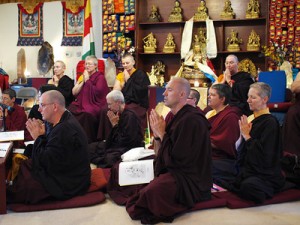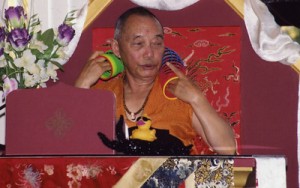From The Spiritual Path: A Compilation of Teachings by Jetsunma Ahkon Lhamo
As human beings, we avoid looking deeply at our ingrained habits and beliefs. We avoid testing them for the qualities needed to develop properly on the Vajrayana path. It’s easier to “go with the flow.” We dislike challenging ourselves. Most of all, we dislike change. We are somehow more comfortable with remnants of our old beliefs, translated into Dharma terminology.
Eastern philosophy is difficult for Westerners to understand. There are so many major differences, including the basic premise and the value system. Though the various motivations for practice set forth by the Buddha are universally true, people tend to select what resonates most with what they learned while growing up. Your culture strongly influences your reasons for practicing Dharma—and how you under-stand it. Those whose needs are generally satisfied react very differently from people who have seen war, suffering, and famine. The latter tend to hang on to Dharma for dear life. But many Dharma-practicing Westerners complacently think: “If I can just get another precious human rebirth, I’ll be okay.”
Not so for those who have seen intense suffering. They are apt to think: “I want out. I want my mind to be free of the causes of suffering. I am sick of revolving helplessly on this wheel. I’m tired of watching my loved ones go hungry and die young.” When you have seen war, you know that death could be just a moment away. But we Westerners rely on medical marvels. We have faith that if someone can just get us to the hospital in time, we will be saved.
The great blessing here in the United States is that many people have a strong karmic relationship with compassion. Thus, I talk more about compassion than about suffering. But it may not be enough to practice Dharma because you feel a sense of mission and purpose—however pure your intention might be. That is not the same as hanging on to Dharma for dear life. If you have not understood in the depths of your being how impermanent this life is, if you have not really understood the terrible prospect of revolving endlessly in cyclic existence—you tend to be much more casual in your attitude toward practice. You may not challenge yourself to do your best.
Westerners need a constant shot of inspiration. We seek it out. We eat it like candy, and we love it! But just like candy, it soon lets us down. And even if we practice with the intention to help sentient beings, there is still a catch: our practice gives us a sense of identity. Right now, your sense of identity determines why you live, what you do, what is important to you. But it also makes you a traveler who is standing still. We can move very fast in our practice and yet remain quite stiff inside. If we practice because we want to be a good person who helps others, we become comfortable with that identity. We do not feel the urgency of someone living with the constant threat of being bombed—or someone who has known hopeless hunger.
We may adopt some new ideas, but our beliefs are basically unchanged. And so is our predicament. We still believe that we will exist as we are forever, if not in the same body, then with the same consciousness. We hope to attain the goal of realization as ourselves. We believe we can keep ourselves intact, and then, we will somehow appear in a celestial form in order to benefit beings. As to what we will actually do, we vaguely envision bringing love and light to the world, the bounty of our great wisdom. And to do that, we will continue to exist in some way that is recognizable to us.
We have now come to a delicate but crucial distinction, and we must tread carefully. We pray to retain awareness throughout the process of death—so that during the bardo transference we can achieve realization or, at least, rebirth in a most fortunate way. We also want to come back in an emanation form in order to benefit beings. However, we may not yet have really challenged our ideas of foreverness and sameness. That is, we haven’t given up on ego, on surviving. This is a product of our culture. Christians aspire to survive death and go to heaven. A Buddhist, however, hopes to remain awake and not faint during the time of transference in the bardo state, but understands that what remains is not the self or the ego: it is awareness itself, the pure, essential mind-nature, unobscured, un-hindered by dirty winds and channels. It is not the natural state of you, the person you are right now. If you are hoping that this “you” will remain intact, you have a different religion programmed into your brain. The correct goal is not to survive in an eternalistic way, reaching a heaven-like Dewachen and then returning as a Buddhist angel to help people.
When you pray for others, do you wish for all sentient beings to know love and light? As Buddhists, we can no longer have this as our prayer. Why? When you do that, you are wishing for sentient beings to remain intact forever, revolving in a state of impermanence. This is very different from praying that the causes for suffering will be erased from their minds, that they will realize the primordial-wisdom state.
What should you as a Buddhist hope for? That when you enter into the bardo, or into your prayers, or even into the next moment, you will instantly come to know the emptiness of all phenomena, the emptiness of self-nature. Self-nature is like a puffball. You should pray to see it for what it is: poof! Just like that. You should pray with all your heart to realize the primordial, natural, pure view—the Nature which is free of all concepts, all mind-chatter. That Nature miraculously survives beneath all the garbage we pile on top of it. That Nature is pure, all pervasive, with neither beginning nor end. When you attain that view, form and formless are seen to be the same, and self is only luminosity.
© Jetsunma Ahkön Lhamo

